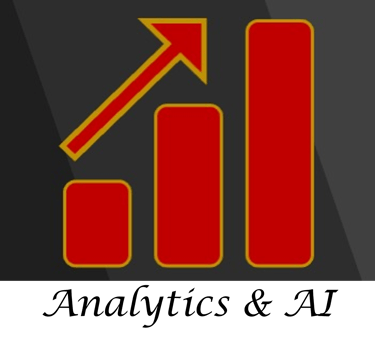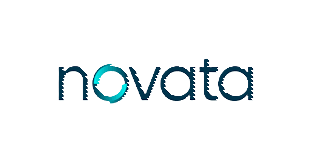ESG Essential Software Tools - Tracking, Measuring, Reporting, and Improving Performance
ESG
Analytics & AI Staff
6 min read
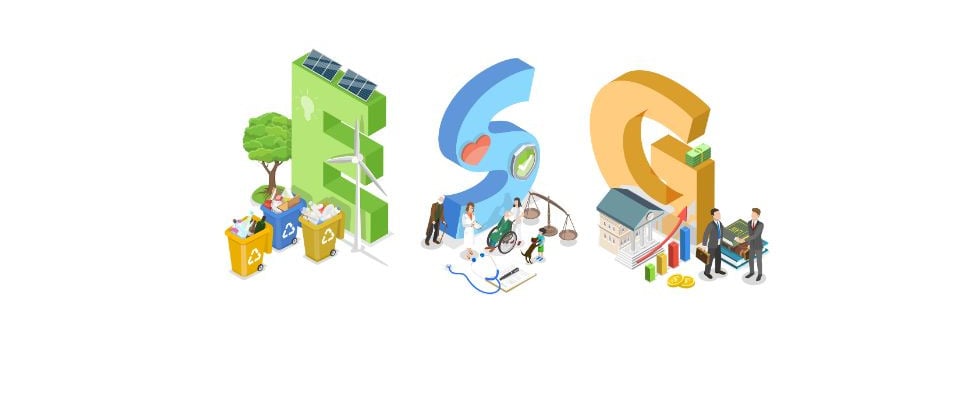

When navigating the complex world of ESG, companies should select practical software tools that will facilitate effective measurement, reporting, and improvement of their ESG performance.
ESG Essential Software Tools
Tracking, Measuring, Reporting, and Improving Performance
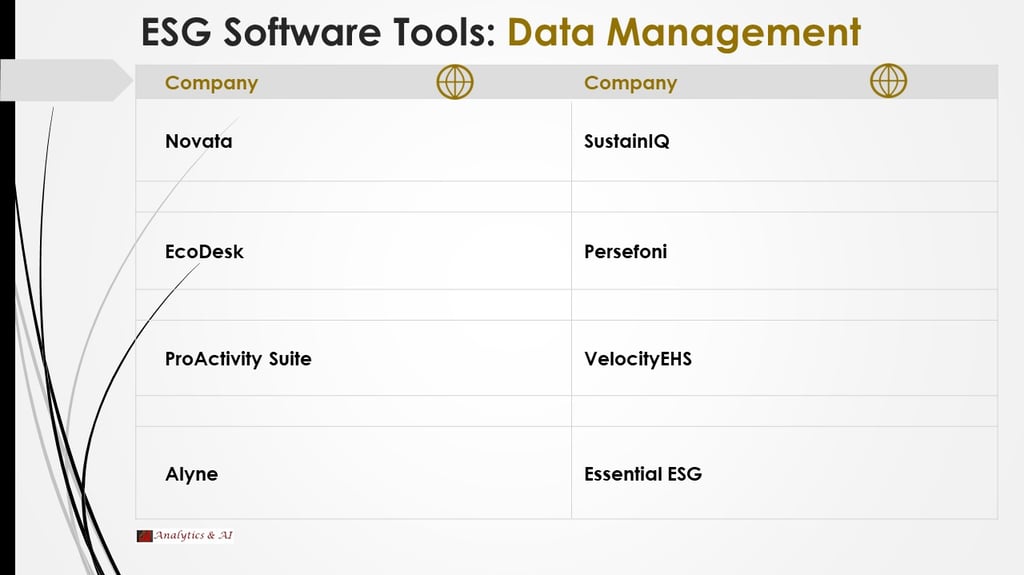

By investing in the right software tools and utilizing them effectively, companies can improve their environmental and social impact, and ultimately unlock strategic business benefits.
The following factors, listed by key categories, are to be considered when selecting the most relevant tools that fit your company’s unique needs and unlock the full potential of data driven ESG management.
ESG Data Management
Software Tools Considerations:
Size and Complexity: Larger enterprises may require extensive functionalities and risk management features while, smaller companies may prioritize ease of use and affordability.
ESG Priorities: Focus on tools catered to your specific industry's concerns and sustainability goals.
Budget: Set a realistic budget and compare pricing models of different platforms.
Integration and Scalability: Ensure the tool integrates seamlessly with existing systems and can scale with your future growth.
Relevant Software Tools:
Relevant Software Tools:
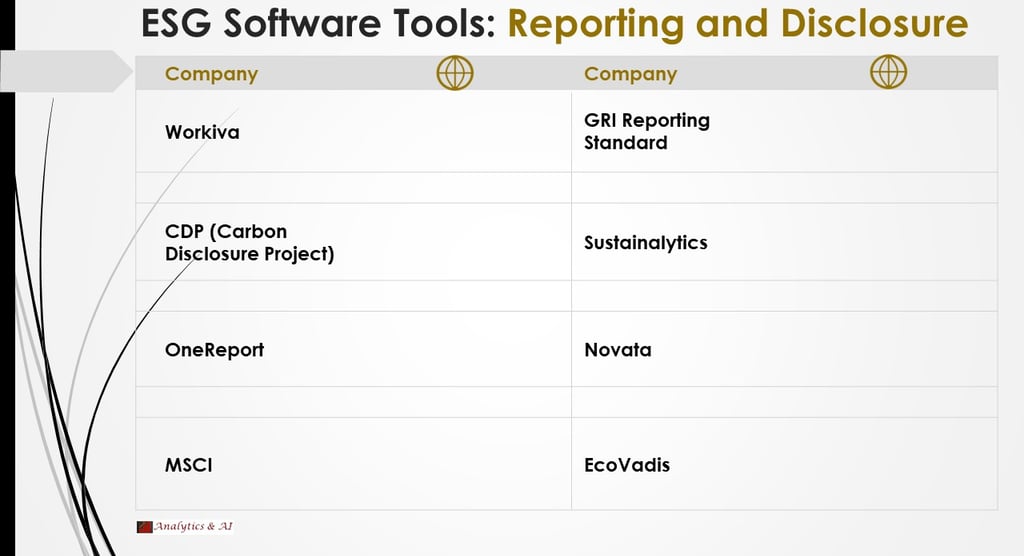

ESG Reporting and Disclosure
Software Tools Considerations:
Reporting Requirements: Identify the frameworks and regulations needed to be in compliance with GRI, CDP, SEC regulations, etc.
Data Management: Assess your data collection capabilities and how the tool integrates with existing systems.
Customization: Determine the level of flexibility you need to tailor reports to your specific industry and goals.
Budget and Resources: Choose a tool with pricing and implementation costs that fits your budget and team's technical skills.
ESG Sustainability Performance
Software Tools Considerations:
Company Size and Complexity: Smaller companies may prioritize ease of use and affordability, while larger enterprises may require extensive functionalities and data analytics capabilities.
Industry and ESG priorities: Focus on tools catered to your specific industry's challenges and sustainability goals.
Budget and Resources: Set a realistic budget and compare pricing models of different platforms.
Integration and Scalability: Ensure the tool integrates seamlessly with existing systems and can scale with your future growth.
Relevant Software Tools:
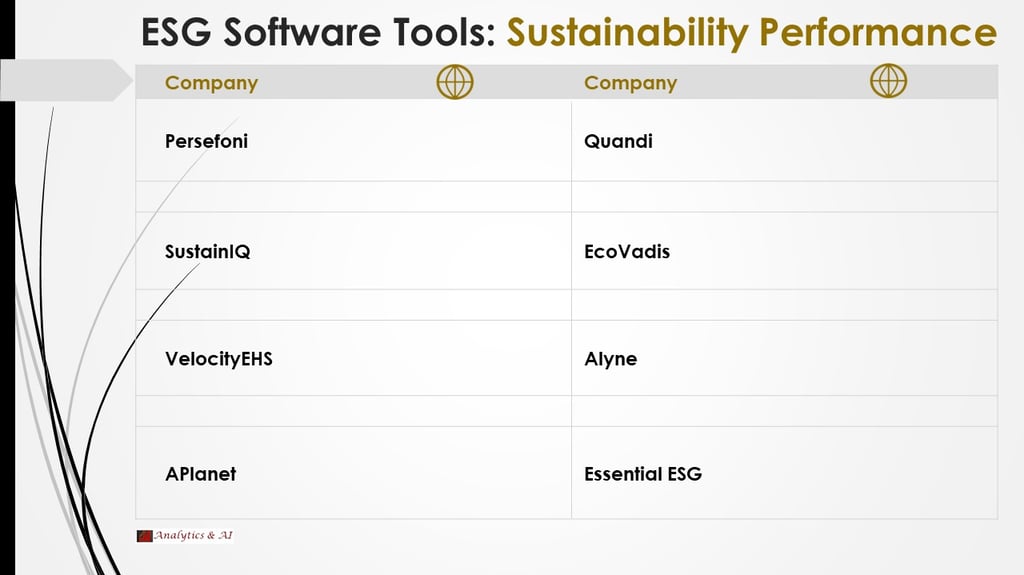

ESG Engagement and Communication
Software Tools Considerations:
Relevant Software Tools:
Target Audience: Identify who you want to engage with (employees, investors, customers, communities).
Communication Channels: Choose a tool that aligns with your preferred channels (email, social media, reports, events).
Content and Storytelling: Select a platform that facilitates compelling and impactful communication of your ESG story.
Budget and Resources: Set a realistic budget and consider training needs for the chosen tool.
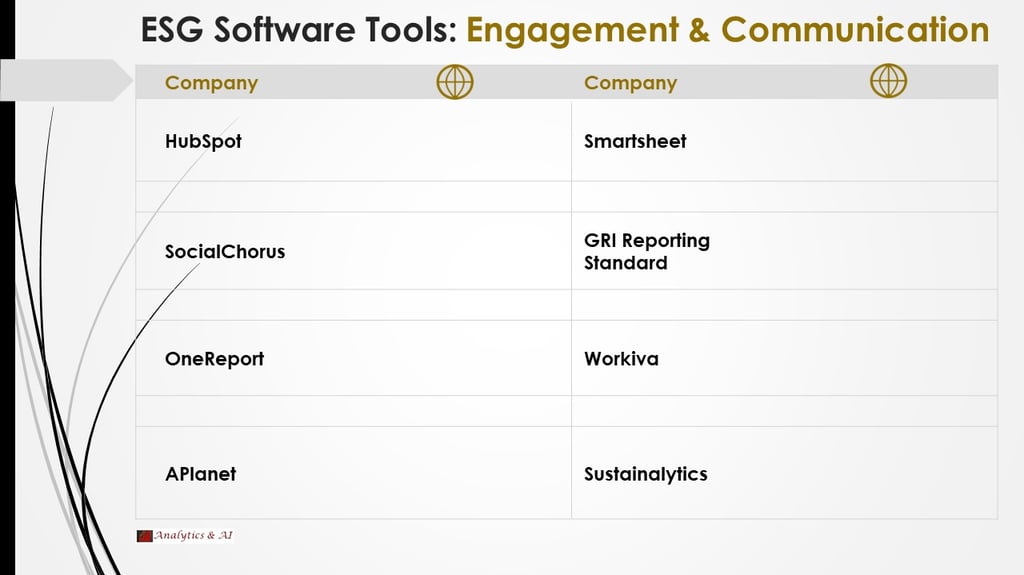

ESG Risk Assessment and Data Management
Software Tools Considerations:
Data Management: Assess your data collection capabilities and how the tool integrates with existing systems.
Customization: Determine the level of flexibility you need to tailor reports to your specific industry, goals, and risk threshold.
Budget and Resources: Choose a tool with pricing and implementation costs that fits your budget and team's technical skills.
Industry and ESG priorities: Focus on tools catered to your specific industry's challenges, sustainability goals, and risk threshold.
Relevant Software Tools:
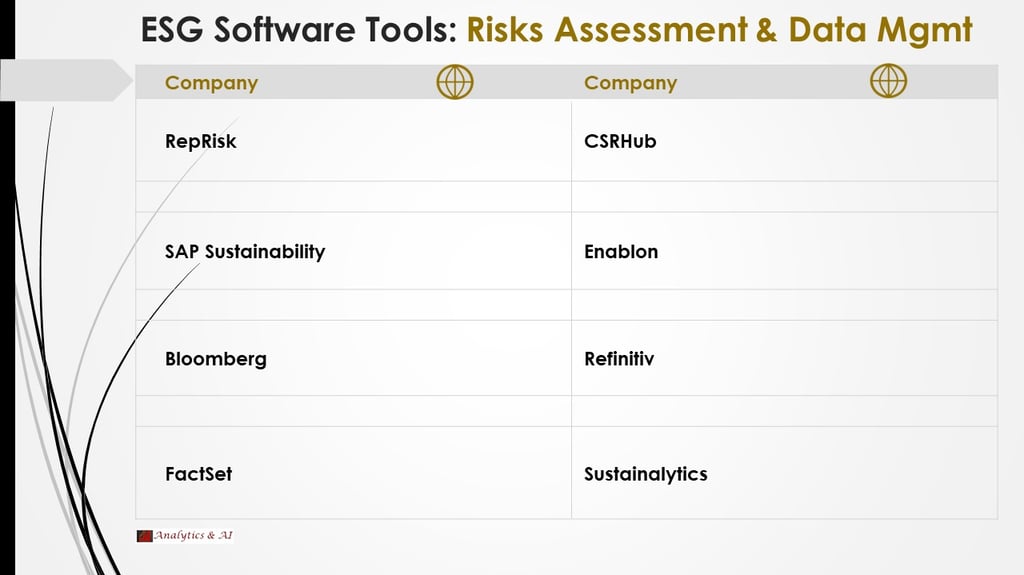

Other factors to consider when selecting ESG data management tools are the strengths and limitations associated with each platform. By understanding the strengths and limitations of each platform, you can choose the best fit for your company's unique needs and unlock the full potential of data driven ESG management.
ESG Software Tools Strengths:
Powerful data aggregation, flexible data collection options, and modeling capabilities
Affordable option for smaller companies, simple data collection and reporting feature
Comprehensive sustainability platform with reporting and goal management features
Easy-to-use and intuitive interface with customizable dashboards
Generates visually appealing and easily digestible reports, simplifies ESG communication for diverse stakeholders
Robust risk management, strong compliance focus with regulatory reporting tools and compliance features
Well-suited for large enterprises with complex needs
Focus on materiality assessments and stakeholder engagement
Streamlined workflow and collaboration features
Globally recognized framework, comprehensive approach to ESG reporting
Focus on climate change and greenhouse gas emissions
Provides ESG ratings and research, simplifies benchmarks and comparisons, strong data analysis capabilities
Cloud-based platform with automated reporting functionalities, integrates with multiple data sources
AI-driven insights and scenario planning
ESG Software Tools Limitations:
High cost can be complex for smaller companies.
Limited customization options, primarily focused on investor relations reporting and external disclosure, not a comprehensive reporting platform.
Steep learning curve requires significant reporting expertise.
Not a software solution, data collection and analysis not included.
Limited reporting functionalities compared to other platforms can feel basic for larger companies.
May require customization for specific ESG framework.
Primarily focused on climate change, limited scope for broader ESG metrics
It is vital that companies understand no single tool fits all needs. Evaluate your company's specific requirements and priorities before deciding. Implementing the right ESG data management tool, can streamline your sustainability journey, unlock valuable insights, and help you demonstrate your commitment to stakeholders.
Select tools that will, at a minimum, provide comprehensive ESG reporting and analytics, identify relevant trends, manage strategies, and generate insightful reports for stakeholders. Companies need to ensure that chosen tools align with the company's ESG goals and facilitate effective measurement, reporting, and improvement of their ESG performance.
Sources:
World Business Council for Sustainable Development - https://www.wbcsd.org/
GreenBiz - https://www.greenbiz.com/
B Lab - https://www.bcorporation.net
CDP (Carbon Disclosure Project) - https://cdp.net
UN Sustainable Development Goals - https://sdgs.un.org/goals
Let's Connect!
Subscribe to our Resources










